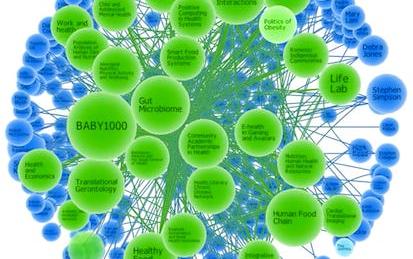

Our Courses

Nutrition and Cancer
Cancer has overtaken cardiovascular disease (CVD) as the leading cause of death in many parts of the world. It causes one in eight deaths worldwide. Global trends show that the majority of all cancer deaths occur in the low- and middle-income countries. Yet, cancer can be partly prevented and many of these deaths can be avoided.
Discover the latest insights on the role of diet, nutrition and lifestyle in the prevention, occurrence and progression of cancer in the open and online course Nutrition and Cancer.
-
Course by

-
 Self Paced
Self Paced
-
 21
21
-
 English
English

Non-Communicable Diseases in Humanitarian Settings
NCDs are the leading cause of death in almost every region of the world, and place a huge burden on individuals, families and societies. Humanitarian settings have a negative effect on the levels of disease, and the possibility of treatment. The importance of NCDs in global health is acknowledged by their inclusion in the Sustainable Development Goals, which call for a reduction of a third in premature mortality from NCDs by 2030.
-
Course by

-
 Self Paced
Self Paced
-
 15 hours
15 hours
-
 English
English

Easing the burden of obesity, diabetes and cardiovascular disease
This course is multidisciplinary in nature, and aims to equip the global audience of interested lay people, people with chronic disease, public health researchers, health clinicians, students, administrators, and researchers to reflect on the overall impact of the burden of chronic disease . It shows how all chronic diseases (obesity, diabetes, cardiovascular disease, chronic obstructive pulmonary disease, and cancer) are related by a set of common causes, and that such diseases should be tackled, not individually, but as part of a complex system, with interrelated contributing factors.
-
Course by

-
 Self Paced
Self Paced
-
 16 hours
16 hours
-
 English
English

Chronically Ill in an Emergency: Why Mental Health Matters
In humanitarian settings, mental ill-health is powerfully inter-connected with other non-communicable diseases (NCDs) such as cardiovascular diseases, cancers, diabetes and chronic respiratory diseases. Integrating mental health and psychosocial support (MHPSS) with NCD prevention and care might therefore be useful, both to be more effective, and to require fewer resources.
-
Course by

-
 Self Paced
Self Paced
-
 9 hours
9 hours
-
 English
English

Managing Your Health: The Role of Physical Therapy and Exercise
Managing Your Health: The Role of Physical Therapy and Exercise will introduce learners to the concepts and benefits of physical therapy and exercise. Over six weeks learners will explore: Why physical activity and exercise are important, Exercise and Cardiovascular Disease, Exercise and Osteoporosis, Exercise and Cancer, Common Sports Injuries, Exercise and Arthritis
-
Course by

-
 Self Paced
Self Paced
-
 13 hours
13 hours
-
 English
English

Myocardial Infarction
Cardiovascular diseases are – according to the (World Health Organization (WHO) – the number one cause of death globally. Myocardial infarction (heart attack) is the most prominent under the Cardiovascular diseases.
-
Course by

-
 Self Paced
Self Paced
-
 25 hours
25 hours
-
 English
English

Non-Alcoholic Fatty Liver Disease – The Essentials
Non-Alcoholic Fatty Liver Disease (NAFLD) is a global problem, affecting up to 25% of all individuals. The disease not only increases the risk of liver disease, but also of cardiovascular disease and liver cancer. During this course, you will learn the essentials of NAFLD. We will begin with an introduction to the physiology of the human liver followed by epidemiology, pathophysiology, clinical medicine, and genetics. Diagnosing NAFLD based on blood tests, diagnostic imaging and histology will be discussed.
-
Course by

-
 Self Paced
Self Paced
-
 English
English

Global Disease Masterclass: Non-communicable Diseases
Welcome to this course on the aetiology, epidemiology and interventions for non-communicable diseases of the Global Diseases Masterclass. We’ve selected four disease areas and will go through each in turn. The diseases we’ve chosen are: Colorectal Cancer, Cardiovascular Disease (CVD), Dementia, and Diabetes. We have selected these non-communicable diseases because they span a range of different types of disease process and because of the expertise and experience that our School of Public Health has in these areas.
-
Course by

-
 Self Paced
Self Paced
-
 17 hours
17 hours
-
 English
English



